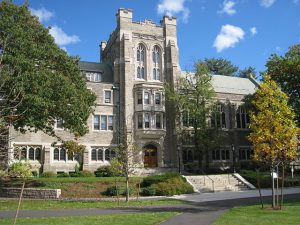As we have noted elsewhere (HarvardX course, the SBL Annual Meeting and Scripture translation), religious literacy among Americans is sorely lacking.
This is significant for several reasons. Misunderstandings caused by this absence often lead to conflict between people of different faiths and, at times, violence, injury and death. The gaps of knowledge in media stories by well-meaning journalists can lead the general public to unfairly and erroneously equate sincere, open-minded practitioners of a religious faith with more radical adherents (think mainline Christians or Muslims versus their radical counterparts). The reluctance of schools to teach about religion, fearing they will overstep restrictions created by the federal ban on school-sponsored prayer, has led to a large swath of younger Americans having skewed understandings of the founding of our nation, the religious faith of Native American groups, the religious underpinnings of the Civil Rights movement, and the rise of Christian Fundamentalism and its antagonism toward science, among other problems. Religion is not just a personal, individual set of beliefs that can be viewed as optional: it is a vitally important component of the human condition. 
Westar Institute, founded originally as the Jesus Seminar by the late Robert Funk in 1985, is one of the premier scholarly institutions promoting religious literacy through its several initiatives: publications, seminars, meetings, website, and social media presence. (Full disclosure: I am a Fellow of the Westar Institute.) The Religion Communicators Council (RCC), founded in 1929 to promote faith perspectives in public discourse, is another resource for religious literacy. RCC has recently recognized Westar with its Wilbur Award in the category of Digital Video; the award honors Westar’s newest video, Westar on the Road, which explains the mission, history, and future of Westar.
 Westar’s video and the awarding of the Wilbur by RCC come at a critical time in our nation’s history. As Debra L. Mason points out in “A Dangerous Business,” published in the Harvard Divinity Bulletin in 2017, there is a serious “religious illiteracy” problem in newsrooms around the US. Mason notes in her article, citing New York Times executive editor Dean Baquet in a 2016 interview with Fresh Air host Terry Gross on NPR, media powerhouses “don’t quite get religion.” Journalists, who reach millions of people every day, are not trained in religion as a scholarly field, and other problems in the news and media businesses further complicate the issue. Therefore, it is vital that journalists and others understand religion and religious issues.
Westar’s video and the awarding of the Wilbur by RCC come at a critical time in our nation’s history. As Debra L. Mason points out in “A Dangerous Business,” published in the Harvard Divinity Bulletin in 2017, there is a serious “religious illiteracy” problem in newsrooms around the US. Mason notes in her article, citing New York Times executive editor Dean Baquet in a 2016 interview with Fresh Air host Terry Gross on NPR, media powerhouses “don’t quite get religion.” Journalists, who reach millions of people every day, are not trained in religion as a scholarly field, and other problems in the news and media businesses further complicate the issue. Therefore, it is vital that journalists and others understand religion and religious issues.
The RCC since its inception “has helped tell the story at the intersection of faith and the public arena, all the while encouraging understanding and respect among faith groups.” The RCC prioritized religious literacy in 2015, developing resources especially with the goal of helping the secular media to understand nuances and basic tenets of the world’s religions.
The RCC’s Wilbur Award was first presented in 1949 and honors the late Marvin C. Wilbur, a pioneer in the field of religious public relations and a former executive in the Presbyterian Church. The Wilbur promotes and encourages excellence in the communication of religious faith and positive values through a variety of secular media. In RCC’s publicity, the Council hopes, through the Wilbur, “to recognize the work of individuals and agencies as they communicate about religious issues, values and themes, with professionalism, fairness and honesty.”
By recognizing Westar on the Road, the Wilbur Award raises the profile of Westar Institute and its work, and those who are already familiar with Westar have another resource in RCC to enlarge their pool of knowledge and enhance their expertise. Journalists and others in the media business should take note of these important developments and take advantage of these quality resources; our civic discourse depends on an informed American public.
Resource
Mason, Debra L. “A Dangerous Business,” Harvard Divinity Bulletin (Spring/Summer 2017) 56-60.
